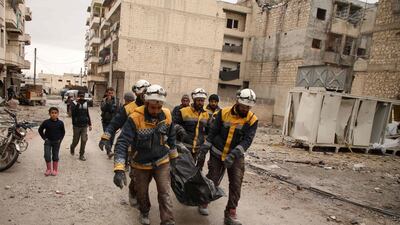Russian air strikes in northern Syria are intensifying to enable the regime to capture two main highways constituting the last strategic asset held by rebels fighting President Bashar Al Assad.
The offensive threatens to encroach on territory Turkey had carved out as buffer zones.
Ankara says it needs the zones to contain US-backed Kurdish militias that had expanded in Syria.
The Syrian Network for Human Rights said at least 100 civilians have been killed since the regime offensive on Idlib and the western Aleppo countryside was launched January 12. Most of them perished in air strikes.
The group and other activists said Russian air raids hit a residential building, a clinic and a bakery in the town of Ariha on Wednesday, killing 10 civilians.
The Russian Foreign Ministry denied responsibility for the strikes, saying its warplanes "did not carry out any combat tasks in this area of Syria".
Ariha is near the M4 highway linking the city of Aleppo with Latakia.
Capturing the road, along with the M5 from Aleppo to Damascus, appears to be immediate target of the offensive, which rebels say also aims to capture Idlib city, the provincial capital.
The attacks are causing renewed waves of mass displacement and pushing the province’s 3 million population into a narrowing strip of territory along the border with Turkey.
On Wednesday Turkish President President Recep Tayyip Erdogan said Russia was violating “de-escalation zone” deals reached under the so-called Astana Process. It was Mr Erdogan’s first direct criticism of Russia since the talks, which include Iran, started under Moscow’s supervision in 2017.
After scaling back support for anti-Assad forces under Russian pressure in the past four years, Syrian opposition sources say Turkey is now sending opposition fighters into Idlib and Aleppo to try to stop the offensive.
Turkey aims to deny the regime advances that would put loyalist forces too close to Afrin, the sources in Istanbul said.
Afrin is a Kurdish militia enclave that Turkey overran in 2018 after reaching a tacit understanding with Moscow and Washington.
The sources said Turkey fears that Russia will help the Assad regime to retake Afrin and areas to the east that Ankara’s troops and its proxy Syrian National Army had captured from Kurdish militia.
But Othman Abdelqader, a prominent civil figure in the Al Rouge Plain in Idlib, said Turkey’s efforts might be too late.
“Idlib as an opposition military front is on the verge of collapsing,” he told The National by phone. “Our concern is no longer the highways, but the regime reaching right up to the Turkish border.”
A significant turning point has been the regime’s capture this week of the town of Maaret Al Numaan, which exposed Saraqeb, a town to the north that sits on the junction of the M4 and M5.
Opposition sources say at least 400 fighters have been killed over the past two weeks, with the casualties roughly divided between the opposition and the regime.
They include dozens of members of Hayat Tahrir Al Sham, an Al Qaeda offshoot that had taken control of Idlib.
A rebel officer in contact with the opposition in Idlib said the losses there and west of Aleppo were “acceptable” for the regime because they largely excluded members of its Alawite core.
He said the regime casualties comprised mainly of conscripts and former opposition fighters who surrendered to the regime in other areas of Syria under Russian-supervised deals that stipulated their incorporation into loyalist forces, where they have been treated as cannon fodder.
Idlib fell to opposition forces that included Al Qaeda in March 2015. Since then Hayat Tahrir Al Sham has mostly taken control of the province, overrunning other brigades.
Idlib’s fall to the opposition, then backed by Turkey, Saudi Arabia and Qatar, contributed to the Russian intervention in September 2015, as the rebels’ gains threatened to isolate Damascus from the coast.
The Syrian opposition officer said Turkey “is gripped by concern that will lose everything in Syria”.
“Turkey needs the rebels to push back on the ground,” he said. “It is the only way to put back Russia at the negotiating table.”


